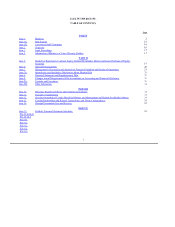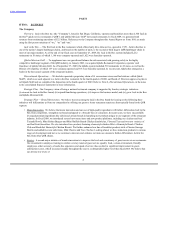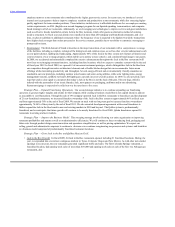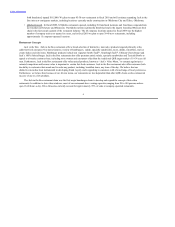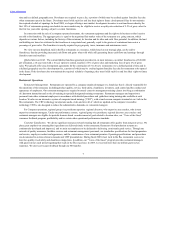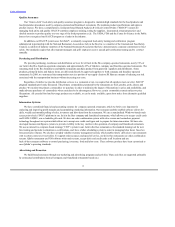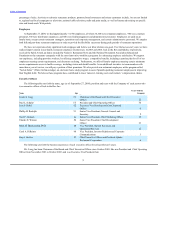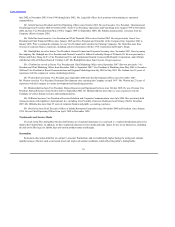Jack In The Box 2009 Annual Report Download - page 12
Download and view the complete annual report
Please find page 12 of the 2009 Jack In The Box annual report below. You can navigate through the pages in the report by either clicking on the pages listed below, or by using the keyword search tool below to find specific information within the annual report.
Table of Contents
The restaurant business is highly competitive and is affected by population trends, traffic patterns, competitive changes in a
geographic area, changes in consumer dining habits and preferences, new information regarding diet, nutrition and health and local and
national economic conditions, including unemployment levels, that affect consumer spending habits. Key elements of competition in the
industry are the type and quality of the food products offered, price, quality and speed of service, personnel, advertising, name
identification, restaurant location and attractiveness of the facilities.
Each Jack in the Box and Qdoba restaurant competes directly and indirectly with a large number of national and regional restaurant
chains, as well as with locally-owned and/or independent quick-service restaurants and the fast-casual segment. In selling franchises, we
compete with many other restaurant franchisors, some of whom have substantially greater financial resources and higher total sales
volume.
Each restaurant is subject to regulation by federal agencies, as well as licensing and regulation by state and local health, sanitation,
safety, fire, zoning, building and other departments. Difficulties or failures in obtaining and maintaining any required permits, licensing
or approval could result in closures of existing restaurants or delays or cancellations in the opening of new restaurants.
We are also subject to federal and state laws regulating the offer and sale of franchises. Such laws impose registration and disclosure
requirements on franchisors in the offer and sale of franchises and may also apply substantive standards to the relationship between
franchisor and franchisee, including limitations on the ability of franchisors to terminate franchises and alter franchise arrangements.
We are subject to the Fair Labor Standards Act and various state laws governing such matters as minimum wages, exempt status
classification, overtime, breaks, and other working conditions. A significant number of our food service personnel are paid at rates based
on the federal and state minimum wage and, accordingly, increases in the minimum wage increase our labor costs. Federal and state laws
may also require us to provide paid and unpaid leave to our employees, which could result in significant additional expense to us.
We are subject to certain guidelines under the Americans with Disabilities Act of 1990 and various state codes and regulations,
which require restaurants to provide full and equal access to persons with physical disabilities. To comply with such laws and
regulations, the cost of remodeling and developing restaurants has increased.
We are also subject to various federal, state and local laws regulating the discharge of materials into the environment. The cost of
complying with these laws increases the cost of operating existing restaurants and developing new restaurants. Additional costs relate
primarily to the necessity of obtaining more land, landscaping and storm drainage control and the cost of more expensive equipment
necessary to decrease the amount of effluent emitted into the air, ground and surface waters.
Many of our Qdoba restaurants sell alcoholic beverages, which require licensing. The regulations governing licensing may impose
requirements on licensees including minimum age of employees, hours of operation, advertising and handling of alcoholic beverages. The
failure of a Qdoba Mexican Grill restaurant to obtain or retain a license could adversely affect the store’s results of operations.
We have processes in place to monitor compliance with applicable laws and regulations governing our operations.
From time to time, we make oral and written forward-looking statements that reflect our current expectations regarding future results
of operations, economic performance, financial condition and achievements of the Company. A forward-looking statement is neither a
prediction nor a guarantee of future events. Whenever possible, we try to identify these forward-looking statements by using words such
as “anticipate,” “assume,” “believe,” “estimate,” “expect,” “forecast,” “goals,” “guidance,” “intend,” “plan,” “project,” “may,” “will,”
“would,” and similar expressions. Certain forward-looking statements are included in this Form 10-K, principally in the
11


